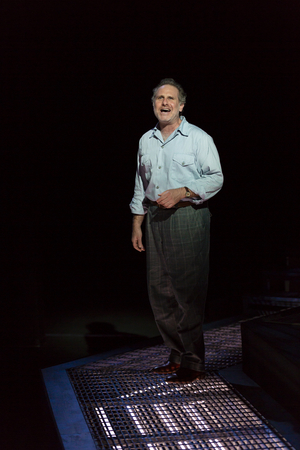Review: Tender GLASS MENAGERIE at Guthrie
 The Guthrie's current production of THE GLASS MENAGERIE (the fifth in its history) is delicate and heartbreaking as well as absolutely faithful to the non-naturalistic spirit of the play, which was so ground-breaking in its day. And while theater nowadays often bounds over all the strictures of realism, making us accustomed to imagistic writing, non-linear structure, and conceptual design, in no way does GLASS MENAGERIE as staged here seem clunky or old-fashioned. It's a true classic and a masterpiece and perhaps, as the young woman sitting next to me said, may remain so for all time.
The Guthrie's current production of THE GLASS MENAGERIE (the fifth in its history) is delicate and heartbreaking as well as absolutely faithful to the non-naturalistic spirit of the play, which was so ground-breaking in its day. And while theater nowadays often bounds over all the strictures of realism, making us accustomed to imagistic writing, non-linear structure, and conceptual design, in no way does GLASS MENAGERIE as staged here seem clunky or old-fashioned. It's a true classic and a masterpiece and perhaps, as the young woman sitting next to me said, may remain so for all time.
It is simply remarkable that Tennessee Williams could write, at age 33, a play so deeply grounded in autobiography, so insightful about family dynamics, and moreover place it so eloquently in the grand scheme of both theatrical and national history, as early monologues by the central narrator Tom explicitly do. It was Williams' first big success as a playwright, after which came a series of huge hits.
Artistic director Joseph Haj has chosen GLASS MENAGERIE as the first Williams play he has ever directed. He trusts the text as well as his company of accomplished actors, and has kept a tight rein on his design team. With the resources available at a regional theater as distinguished as the Guthrie, there can be a tendency to pull out all the stops, with lavish scenic and costume work, lush soundscapes, and wowza lighting. I've seen productions of this play that go there. But I far prefer the simpler, stripped down approach here, which allows the heartbreaking characters and the text to shine.
In keeping with this approach, the actors here eschew bravura performance tropes in favor of committing fully to the relationships within the family. That's not always the case with this script, which contains some great set pieces of monologues, like Tom's El Diablo speech or Amanda's yellow jonquils reminiscence. Here, the actors give those terrific flights of language their full due but without ever losing connection to why, right now, they must say all of this to their infuriating beloveds.
Williams described GLASS MENAGERIE as a memory play. Haj wants that to be his point of focus. The most important way he's done so is to cast an older actor as Tom than is customary: Remy Auberjonois is 45 but reads here as a good decade older. So though the bulk of the story takes place when Tom is in his 20's, we see a man who is walking through his memories of the time long ago when he supported his mother Amanda and frail sister Laura with a job he hated at a shoe warehouse until he couldn't stand it any longer.
Auberjonois is heart-forward in his portrayal without sentimentality. We get every word of the long speeches, even though the actor seems short of breath at times. We believe that Tom has had time to ponder the past and develop the perspective he articulates about what went on back then.
Jennifer Van Dyck plays Amanda without caricature. Sure, she's compulsively and maddeningly domineering, but she can be charming as well. In the first big scene with Laura, her anger is more openly acknowledged than passive-aggressive or whiny. In a fire escape scene with Tom, we get a hint of a gentler companionship possible between them, as she bums a cigarette. Van Dyck is physically a very graceful performer, and she could give a master class in how to use your hands as an actor. Amanda can seem to be a crazed harridan; here, though desperate, she is not, and the love and worry she feels for her fragile daughter are inextricable.
Carey Cox gives Laura a kind of personal integrity, beyond pitiable victimhood. We see that she wants to meet her mother's expectations but it is simply not in her nature to be able to do so. Cox understudied this role on Broadway and so she has had the time to bring greater nuance to the character than is often the case.
The extended scene in the second act between the Gentleman Caller and Laura is as hard to watch unfold as ever. From the audience, we know that it is a slow-motion emotional disaster. That's even more the case because Jim, in the hands of Grayson DeJesus, manages to be likeable despite the character's self-aggrandizement and his readiness to diagnose Laura's condition and give her advice.
Watching this production, I was struck by the inevitability of the tragedy in this family, a family hidden away in a small apartment on the back side of a nondescript building in a midsized American city. It seemed as inevitable as the tragedy in Oedipus' family, so public and archetypal. But this is no less heart-rending.
Congratulations to the assemblage of artists who brought this jewel into the flickering, shifting lights of the thrust space at the Guthrie. There were many empty seats at the early performance I saw. I hope that changes before the show closes October 27.
Photo credit: T Charles Erickson
Reader Reviews

Videos
